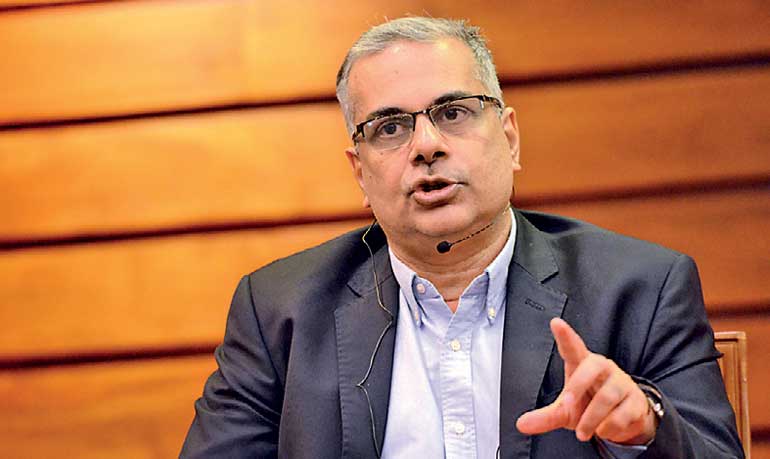Thursday Feb 19, 2026
Thursday Feb 19, 2026
Saturday, 11 May 2024 00:52 - - {{hitsCtrl.values.hits}}
 Advocata Institute Chairman Murtaza Jafferjee
Advocata Institute Chairman Murtaza Jafferjee
- Pic by Shehan Gunasekara
By Charumini de Silva
Advocata Institute Chairman Murtaza Jafferjee on Thursday cautioned against complacency, urging policymakers to prioritise economic stability and enact meaningful reforms to navigate the economy, noting that the country still faces significant hurdles.
“We have gone through a stabilisation program and there is a long way ahead of us. We have to make the necessary policy changes and build the institutions and keep on strengthening them because we have absolutely no room to experiment,” he said speaking at a panel discussion on ‘Sustaining Stability’ organised by the Central Bank.
Citing a report from the International Monetary Fund (IMF) in 2016, Jafferjee highlighted the concerning trend of repeat defaulters among emerging market economies. According to the report, 58% of these economies that defaulted once went on to default again, with an average period of three years between defaults.
Acknowledging that the study spanned from 1978 to 2010 and that circumstances may have evolved since then, he cautioned that the odds of Sri Lanka avoiding a second default are slim.
Digging into Sri Lanka’s economic indicators, he noted that the public debt-to-GDP ratio stood at around 117-118%, down from its peak of 128%. However, he underscored the persistent challenge posed by high real interest rates, which deter consumption and investment, thereby suppressing aggregate demand.
With nominal interest rates hovering around 11-12%, Jafferjee stressed the need for productivity growth as the primary lever to avoid a second default.
Highlighting Sri Lanka’s historical reliance on factor accumulation for growth, Jafferjee stressed the imperative of boosting productivity through market-oriented reforms and increased competition. “Since the Government is unable to stimulate, the rest of the economy must be driven to grow. This growth can only be achieved by enhancing productivity, meaning accomplishing more with fewer resources. Going forward, we have no margin for experimentation. We must build upon our current efforts without regressing,” he explained.
In light of upcoming elections, Jafferjee cautioned against experimental policies whilst advocating for building upon existing stabilisation efforts with consistent and pragmatic policy decisions to boost the economic resilience.
“Politicians in Sri Lanka unfortunately act like demigods and they all believe the gallery. Let’s hope that what utterances they are making is not what they do. While they can say what they want to get into power, what matters is what they do,” he said.
He reiterated the importance of building upon existing stabilisation efforts and implementing necessary policy changes to strengthen institutions to address economic challenges, leaving no room for experimentation.